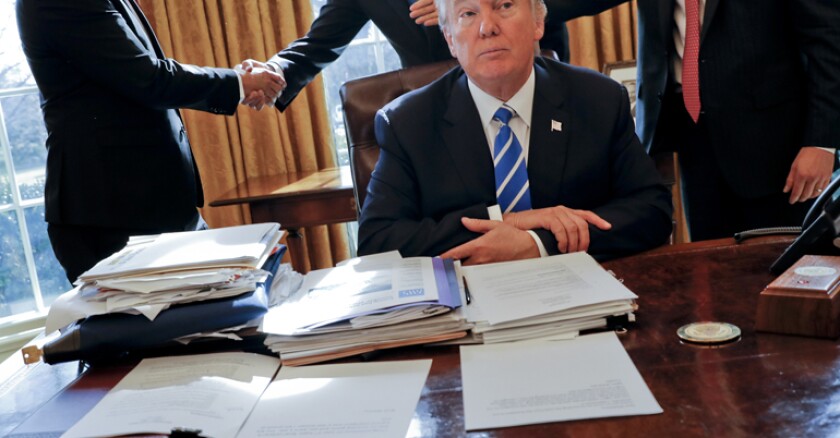Any day now, President Donald Trump is expected to sign legislation that will undo an Obama-era regulation about drug testing the jobless.
Ever since unemployment insurance was created by the Social Security Act of 1935, states were forbidden from drug testing applicants. But last year, the Obama administration finalized rules that let states do so under two circumstances: when applicants lost their employment because of illegal drug use, or when they worked in an occupation "that regularly conducts drug testing," such as directing air traffic or jobs that require use of a firearm.
Conservatives, however, complained that the circumstances were too narrow.
Republican members of the House Committee on Ways and Means said the rule “contradicts Congressional intent [...] to assure future employers that UI claimants reentering the workforce are truly able and available for work.” Wisconsin's Scott Walker, chair of the Republican Governors Association, argued that the regulation doesn't address a key concern among employers: that job applicants often pass through an initial screening only to fail a drug test.
Now that Republicans have control of the U.S. House and Senate, they sent the president a bill, H.J.Res.42, that would allow for the rules to be rewritten. It's unclear, though, who would rewrite them.
Trump, who has expressed support for the legislation, could direct the Labor Department to rewrite the regulation, or Congress could pass a new law on the issue. Last year, U.S. Rep. Kevin Brady of Texas -- who sponsored H.J.Res.42 -- introduced the Ready to Work Act that would have let states decide when unemployment applicants can be drug tested. The bill died in committee but could be revived now that it's likely to garner more support from the White House.
Virtually all states already disqualify a person for unemployment compensation if they lost their job because of drug use. Three states (Mississippi, Texas and Wisconsin) have laws calling for drug testing in their unemployment insurance programs. So far, none have implemented them. But if the rules about drug testing are relaxed, they may start -- and more states could follow suit.
Drug testing the unemployed, however, may invite costly lawsuits.

A person places a urine sample he has just given for drug testing into a bag. (AP/Rich Pedroncelli)
Some legal experts say an expanded definition of allowable drug testing would violate applicants’ constitutional rights. George Wentworth, an attorney with the National Employment Law Project, which opposes the Ready to Work Act, co-wrote a policy brief in February that called drug testing for unemployment insurance “an unconstitutional solution in search of a problem.”
Wentworth noted that federal courts have already struck down drug-testing requirements in Florida and Michigan for another program, Temporary Assistance for Needy Families, otherwise known as welfare. The judges ruled that state governments had violated people’s due process rights protected under the Fourth Amendment of the Constitution.
According to the National Conference of State Legislatures, at least 15 states have drug-testing laws for applicants of some kind of government assistance.
Critics of drug testing, which often include Democrats and advocates for the poor, argue that it's not just unconstitutional but can cost states more than it saves and doesn't help people escape poverty or unemployment.
Despite that, the National Association of State Workforce Agencies, a bipartisan group whose members administer unemployment insurance, supports the resolution on Trump's desk because they see it as a way to grant flexibility to states.









